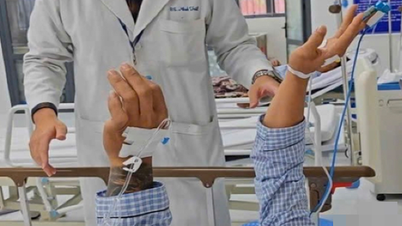Many unfortunate cases lead to immediate death, causing concern and raising questions about the potential risk factors for this incident. Here, Dr. James P. Daubert, a sports cardiologist at Duke University (USA), will explain the reasons why and how to prevent it to help you feel secure while running.
Most cases of sudden cardiac death in young athletes are due to undiagnosed and rare heart diseases - Illustration: AI
What could explain such sudden deaths?
Sudden deaths in otherwise healthy and fit athletes may be due to an underlying cardiovascular problem, combined with strenuous physical activity.
Most cases of sudden cardiac death in young athletes are due to undiagnosed and rare heart conditions. These are underlying inherited heart conditions or genetic mutations, including:
- Heart muscle disorders, such as abnormal thickening of the heart muscle, are often inherited.
- The second inherited heart disease is an electrical heart problem, such as an abnormal heart rhythm or rare conditions like long QT syndrome, Brugada syndrome, and catecholaminergic polymorphic ventricular tachycardia.
- Myocarditis weakens the heart muscle.
- Certain congenital heart diseases — heart defects present at birth — can cause sudden cardiac arrest, such as congenital abnormalities of the coronary arteries that block blood flow to the heart, according to the health news site Health Xchange.
Doctors say: If stimulated and triggered, the above four cases can cause the heart to suddenly stop beating.
What should be done to prevent sudden death while running?
There are a number of things you can do to ensure the lowest possible risk of sudden death while running.
Regular screenings. Get a physical exam before you start your running program and annually. Ask about your family history, especially if you have a family history of heart disease or a relative who died suddenly before age 50, as inherited heart disease can be a risk factor.
People with signs, symptoms, or a known or potential family history of certain heart conditions should have additional testing, Dr. Daubert said. This may include an electrocardiogram, echocardiogram, MRI, or a heart monitor. A stress test may also be needed, according to the Duke University School of Medicine- Duke Health website.
Recognize worrisome symptoms
In many cases, there are few or no warning signs of sudden cardiac death in young athletes, explains Dr. Daubert. However, if you experience chest pain, shortness of breath, palpitations, excessive fatigue, or lightheadedness and fainting, especially during exercise, you should be thoroughly evaluated before participating in a run, as these symptoms could signal a heart problem.
Drink enough water because dehydration can put stress on the heart - Photo: AI
Practice correctly
Exercise should be gradually increased in duration and intensity to allow the body to adapt. Warm up and cool down properly before exercise. Drink plenty of water, as dehydration can put stress on the heart. Do not push yourself too hard, especially when starting a new exercise program or after a period of inactivity.
Prepare for emergencies
Even with all the proper precautions, sudden cardiac arrest can still occur in young athletes in rare cases. Consider taking cardiopulmonary resuscitation (CPR) training and using a defibrillator to prepare for an emergency.
If possible, an automated cardioverter-defibrillator should be available at the running site and someone trained to use it should be able to diagnose and treat dangerous arrhythmias.
Know how to quickly contact emergency services in case of a medical emergency.
By following the above guidelines, you can significantly reduce your risk of sudden death while running and enjoy a safe and healthy running experience.
Source: https://thanhnien.vn/dot-tu-trong-khi-chay-bo-bac-si-chi-cach-ngan-ngua-185250806223427795.htm








































![[Photo] "Ship graveyard" on Xuan Dai Bay](https://vphoto.vietnam.vn/thumb/1200x675/vietnam/resource/IMAGE/2025/11/08/1762577162805_ndo_br_tb5-jpg.webp)


![[Video] Hue Monuments reopen to welcome visitors](https://vphoto.vietnam.vn/thumb/402x226/vietnam/resource/IMAGE/2025/11/05/1762301089171_dung01-05-43-09still013-jpg.webp)



































































Comment (0)